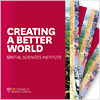Award recognizes M.S. in GIST alumna’s work to combat the disease tungiasis
At the April 2018 Annual Meeting of the American Association of Geographers (AAG), the Health and Medical Geography Specialty Group (HMGSG) of the AAG awarded the Jacques May Thesis Prize for 2018 to USC Spatial Sciences Institute alumna Katherine “Kelly” Wright.
The HMGSG has awarded this annual prize since 1985 to masters or doctoral students whose thesis addresses themes in health and medical geography. A panel of reviewers award the prize based on the thesis contribution to the health and medical geography field, the thesis methodological approach, organization, and written composition. Wright’s thesis “The Chigoe Flea Eradication Project (CFEP) and Tungiasis eLibrary Web Mapping Applications” discusses Wright’s program to raise awareness about and to actively combat tungiasis, a painful, debilitating, and disfiguring disease of poverty caused by the microscopic Chigoe flea tunga penetrans.
For her thesis project, Wright used the efficacy of web GIS as a disease management strategy by establishing a collaborative virtual workspace for aid workers, aid organizations, and governments of afflicted regions. She created an app for humanitarian aid workers to gather epidemiological data using volunteered geographic information (VGI) approaches. This information is enabling the medical community to develop treatment options and to help qualify tungiasis as a “neglected tropical disease” by the World Health Organization (WHO). The project’s global map provides the first-ever authoritative global spatial distribution of tungiasis.
As a Jacques May Thesis Prize recipient, Wright received an official certificate and a cash award of $200. Read more about her project. Dr. Jennifer Swift served as Wright’s thesis advisor, with Dr. Elisabeth Sedano and Dr. Katsuhiko Oda serving on her thesis committee. “We are thrilled that the impact of Kelly’s work with tungiasis continues to be recognized,” said Swift, associate professor (teaching) of spatial sciences with USC Spatial.
Wright is the co-author of the article "Control of Tungiasis in Absence of a Roadmap: Grassroots and Global Approaches" published in July 2017 in the journal Tropical Medicine and Infectious Disease. Dr. Swift, Lynne Elson, and Herman Feldmeier are her co-authors.
Wright recently chaired the first-ever panel session entitled “Women in GIS” at the 2017 Ohio GIS conference in addition to developing a “Cleaning Dirty Data” technical session, and works closely with the Ohio Chapter of URISA and local GIS users’ groups to promote diversity and inclusion in the field. She is a member of the recently-established Women in GIS (WIGIS), the American Association of Geographers (AAG), URISA International, the American Geographical Society (AGS), the Cartography and Geographic Information Society (CaGIS), Esri’s Young Professional Network (YPN), the Global Health Council (GHC), and the Ohio Academy of Science.
As a student in the USC M.S. in Geographic Information Science and Technology Program, Wright received the 2017 USC Spatial Sciences Institute Esri Development Center Student of the Year Award. Since completing her M.S. in GIST at USC, Wright works as a GIS applications specialist with LJB, Inc., an architectural and engineering firm in the Dayton, Ohio area where she develops web mapping applications for a variety of private and public clients on transportation and public works projects. She continues to advocate for applying GIS to humanitarian and socioeconomic issues, including America’s ongoing opioid epidemic.




